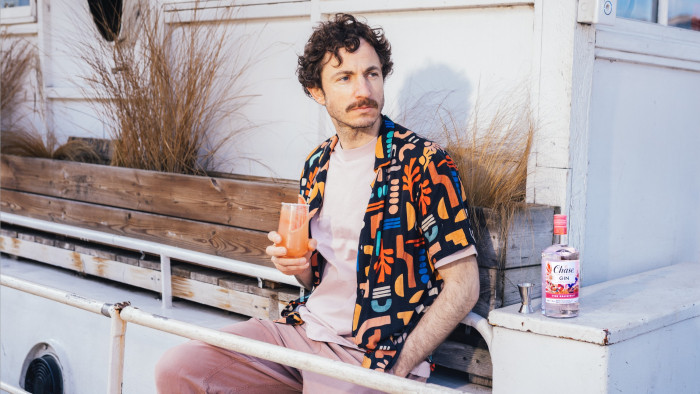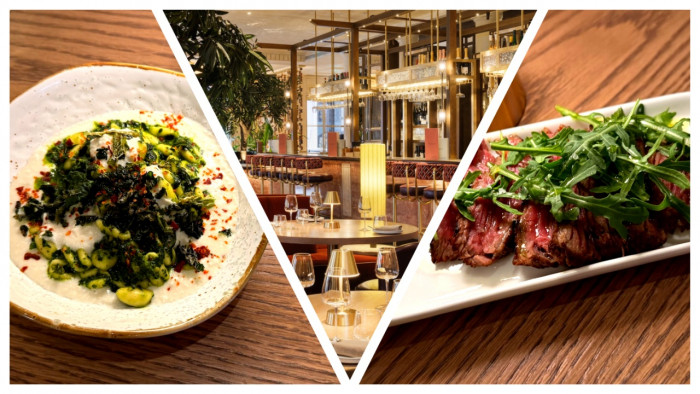An acclaimed new novel has cheered Will Self up. Just don’t mention the Olympics, ShortList’s Jimi Famurewa learns
“He’s quite antagonistic, he’s completely up himself and he uses all these long words,” says Will Self when tentatively asked what people think of him. As descriptions of his own public persona go, it’s one most would struggle to argue with. “That’s fine, it doesn’t bother me,” he says with a smile. “They can think what they want.”
That conspiratorial smirk nods to the fact that – from the moment he arrives at the appointed Soho café, wheeling a folding bicycle and trying to procure a chair outside – Will Self isn’t what you expect. The intellectually imposing writer and professional curmudgeon we’ve heard about mostly fails to materialise during ShortList’s hour-long interview. He’s funny, friendly and, whisper it, quite nice.
“People can’t assimilate that,” explains the 50-year-old, cramming a roll-up into a plastic cigarette holder. “The idea of light comedy and heavy literature bamboozles [them] because they want you to be one thing or another. It annoys people. But that’s all right.”
It may be that we’ve just caught him during a particularly happy period. Umbrella, his ninth novel, was placed on the 12-title Man Booker Prize longlist this year.
“I’m delighted [about the Booker],” he says proudly. “Hopefully the novel will find some readers. But it’s not me that’s longlisted, it’s the book. And books are like children. They kind of leave home and grow up. Some of them end up shoving beer bottles up their jacksies trying to get money for crack. And others become respectful small town solicitors.”
GROTTY ROOMS
Umbrella, to extend this familial analogy, could comfortably be described as a difficult child. The antithesis of an easy sun-lounger read, it leaps across a century in an unbroken 400-page, modernist stream of consciousness that takes in the First World War, the rare “sleeping sickness” known as encephalitis lethargica, a Seventies mental hospital and London’s modern-day tower blocks. It’s mad, disorienting and mesmerising. The book also features a sweary, brutal, muck-caked depiction of Edwardian life that’s a world away from TV’s starchy period dramas. Was it written as a deliberate antidote to Downton Abbey?
“Yeah, that’s what I really wanted to do,” he admits. “There’s this fantastic book, published in 1903, by Jack London called The People Of The Abyss. He was an American but he came and did a tour of east London. There’s one fantastic aside in it where this Cockney is talking and [it says] something like, ‘He uses the worst epithet that there is. It is the most commonly used by the Cockneys. It is the one they use as a verb, a noun and as an adjective.’ And I thought, it’s ‘f*ck’. That has never got in middle class literature, either then or now. They won’t accept that working class people were effing and blinding, they weren’t speaking in a very flowery way and they f*cked. They said f*ck and they f*cked. My first priority for those periods of the book was to convey that reality to people.”
Self’s somewhat antiquated writing methods might have helped with grimy period authenticity too. He works in what he describes as his “grotty room in south London overlooking two crack dealers”. Plus the cigarette holder isn’t his only old-fashioned habit.
“I’ve gone back to using a typewriter for the first draft,” he says. “It forces you to think. Instead of going, ‘She wore a red dress. Wait, that’s banal I’ll make it purple or green...’ you think, ‘Right, what colour was her dress.’ It brings order back into your mind.” The other bonus, Self explains with a grin, is that it thwarts procrastination.
“My move into typewriters exactly coincided with broadband,” he says. “If you work on a computer you could be watching porn or buying some reindeer oven gloves or whatever. Disable the internet, that’s my advice [to budding writers]. I always remember this writer I knew years ago, I won’t tell you his name but he’s quite well known and he had a couple of successful books then went silent for years and years.
“I ran into him at a party and he was quite coked up and totally unbuttoned. I said, ‘Why haven’t you published anything for years?’ And he said, ‘Everybody’s got an obsession, Will. Mine is girls with guns in boots. Before broadband it was alright because it was manageable. But not now.’ That was it. He had spent six or seven years looking at images of girls in boots with guns while he should have been f*cking writing. That could happen to anybody. That could happen to me.”
CLEAN LIVING
Another reason for Self’s enviable productivity (including non-fiction and short story collections, Umbrella marks his 23rd book) is his improved health and teetotal status. “I haven’t had any drink or drugs for 10 years now,” admits the former heroin addict.
“I think an aspect of my drinking was that I’m not a very sociable person. So [when I drank] I was kicking against my own nature. I started using drugs and drinking heavily in my teens, so I had no physical life as a young man. I’ve had a life a bit like Dorian Gray [since quitting].”
This renewed vigour also resulted in a walking habit that would make even the hardiest countryside rambler wince. Self has just returned from a 15-mile canyon hike in the US with his son Ivan, in 2006 he walked 26 miles to Heathrow, flew to JFK and walked 20 miles to Manhattan. He’s blithely strolled through gang-controlled areas such as South Central and Compton, but says he’s been mostly safe. “Luckily, I don’t look like I’ve got any money on me,” he drawls.
It may surprise some to note that this period of intense sobriety and power-walking also overlapped with Self dressing up as Britney Spears when he was a team captain on Shooting Stars. Does he regret any of that daftness? “No, I really enjoyed it. It was like my paternity leave,” he admits. “Once you’ve signed up for something like that you’d just be a w*nker if you didn’t do certain things. Vic and Bob are tricky customers though. They’re quite dark [people].”
Our time, and troublingly-strong coffee, is nearly finished. Having proffered even-handed opinions on everything from Fifty Shades Of Grey (“These things are viral but I feel no compulsion to read it”) to Twitter (“Not for me. It’s very funny but it’s a social medium and I’m not a very social person”), Self’s niceness shows no sign of fading. What better way to burnish this pleasant new persona than by asking him about the wave of Olympic and Paralympic optimism currently sweeping the country?
“I loathe that sh*t,” he spits, scuppering our plans. “It’s a total f*cking lie from top to bottom. Just to take one aspect of it, competitive sport doesn’t make people better, it makes people worse. Psychologically it makes people worse people.” He settles into his argument and picks up the pace.
“Second point: how often do you meet an elite athlete that has done anything else in any other walk of life? Is Usain Bolt going to paint a fantastic painting or do neurosurgery? So what’s the f*cking point of it? The other thing is it’s completely, stupidly, relentlessly commercialised. Lastly, it’s elite in every sense. Three quarters of the [medal-winning British Olympic] team were privately educated. I’ve got nothing but contempt for it. It’s completely arbitrary.”
It’s fair to say our hopes for some flag-waving triumphalism have been dashed. Order is restored and Will Self the terminal Grinch has finally appeared. Earlier in the afternoon, when asked about his perception in the public eye, Self had wryly stated, “I just want to be misunderstood.” As he says goodbye, settles the bill and rides off on his bike, we can’t help but think he’ll get his wish.
Will Self will launch new book Umbrella at Southbank Centre on 13 September and curate events on Modernism; southbankcentre.co.uk/literature
(Image: Rex Features)
Latest
Related Reviews and Shortlists










